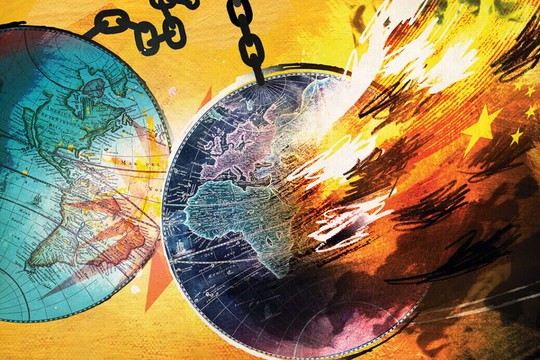Unlike in the bipolar world during the Cold War, the behaviour of the majority is the most crucial factor that will determine the structure of the future international order, writes M.K. Bhadrakumar, Indian Ambassador and prominent international observer.
The latest happenings in international politics may seem esoteric, like the secret ceremonies of Knights Templar of the medieval order. But they are anything but abstruse. It has dawned on most rational minds that the conflict in Ukraine is not intrinsic but symptomatic of an epochal struggle consequential to the making of the World Order.
On March 20, British Defence Minister Annabel Goldie stated in the House of Lords that her government would provide Ukraine with shells containing depleted uranium. Indeed, there is a tragic precedent — NATO’s use of depleted uranium shells while carpet-bombing Serbia during Yugoslavia’s dismemberment. (Today, the highest incidence of cancer in entire Europe occurs in Serbia.)
Britain, chafing under its free fall as a world-class power, is overzealous about power projection, and, fortuitously, Washington also desperately requires a ‘game changer’ to stave off defeat in Ukraine. But madness has limits. If the Anglo-Saxon bravado translates into action, there is bound to be a fearsome Russian reaction.
Suffice to say, we are tiptoeing toward use of tactical nuclear weapons in modern warfare, with all its horrific implications for South Asia. India must voice concern over the Anglo-Saxon move.
Again, on March 14, the United States, the United Kingdom, and Australia (AUKUS) unveiled the details of their plan to create a new fleet of nuclear-powered submarines. AUKUS is undermining nuclear non-proliferation efforts. Alongside, AUKUS is also preparing for a military showdown with China.
Furthermore, Japan continues to ratchet up its hostile power projection vis-a-vis Russia and China, while simultaneously returning to the path of militarisation which it abandoned after World War II. Whether New Delhi voiced its concerns to the Australian and Japanese Prime Ministers visiting India recently we do not know.
There is another side to this, too. For, AUKUS is coercing the IAEA Secretariat into endorsement on the relevant safeguards issues. This is yet another instance of the Western powers systematically dismantling the United Nations system to serve their geopolitical interests.
Plainly put, the US is replacing the UN with NATO as a global security organisation, anticipating that its capacity to dominate the world body is fast diminishing. NATO’s arrival in Asia is already foretold.
Two other major developments last fortnight — the reinvigoration of the “no limits” strategic partnership between Russia and China, and the China-brokered Saudi Arabia-Iran normalisation pact — are of a different genre, but signify the shape of things to come in India’s external security environment.
One lifts the veil on the military-political confrontation between Russia and the West which is going to shape international politics in the 21st century, while the second development in India’s extended neighbourhood carries a sense of immediacy as the harbinger of international politics being shaped by the many states that do not seek to align themselves with the banners of the opposing sides. Here lies the germane seed of the new world order for countries such as India, stresses M.K. Bhadrakumar.
read more in our Telegram-channel https://t.me/The_International_Affairs

 9:58 31.03.2023 •
9:58 31.03.2023 •























